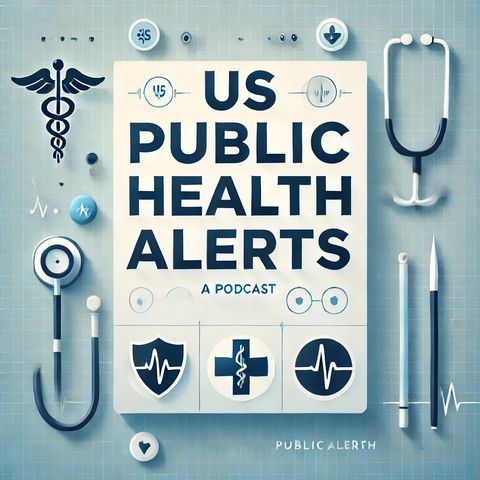U.S. Public Health Alerts for October 2024: Respiratory Virus, West Nile, Wildfires, Food Poisoning and More

Download and listen anywhere
Download your favorite episodes and enjoy them, wherever you are! Sign up or log in now to access offline listening.
U.S. Public Health Alerts for October 2024: Respiratory Virus, West Nile, Wildfires, Food Poisoning and More
This is an automatically generated transcript. Please note that complete accuracy is not guaranteed.
Description
Today, October 8, 2024, Public Health Alerts in the United States include a range of issues that listeners should be aware of to maintain their health and safety. The Centers...
show moreCurrently, one of the most pressing public health concerns is the ongoing outbreak of a novel respiratory virus similar to the seasonal flu. Reported cases have been increasing, particularly in populated urban areas. Health authorities advise individuals to get this year's flu vaccine, which is available at clinics and hospitals nationwide. The vaccine has been updated to better match the prevalent strains. In addition, simple preventive measures such as regular handwashing, wearing masks in crowded places, and maintaining good respiratory hygiene are strongly recommended.
Another significant health alert involves the spread of West Nile virus, which is transmitted through mosquito bites. Although cases are typically more frequent during the summer, warm weather extending into the fall has led to a prolonged period of risk. Health officials continue to emphasize preventive steps like using insect repellent, wearing long sleeves, and eliminating standing water around homes where mosquitoes can breed.
On the environmental front, air quality alerts have been issued in several parts of the country due to ongoing wildfires. States such as California, Oregon, and Washington are experiencing increased levels of particulate matter in the air. People living in affected regions are advised to limit outdoor activities, keep windows closed, and use air purifiers to maintain indoor air quality. Vulnerable populations, including those with pre-existing respiratory conditions, should be particularly cautious.
In addition to these ongoing issues, the CDC has identified an outbreak of foodborne illness linked to a specific batch of pre-packaged salads distributed in multiple states. The contaminated salads have been recalled, but health officials warn that symptoms of the illness include severe stomach cramps, diarrhea, and vomiting. Listeners should check recent purchases and consult the CDC website for detailed information on affected products.
Health services have also issued advisories about a recent uptick in Lyme disease cases. This tick-borne illness, common in the Northeastern United States, is caused by the bacterium Borrelia burgdorferi. Increased outdoor activity during the mild fall weather contributes to exposure. To minimize the risk, people should perform tick checks after being outdoors and consider using tick repellents.
The public health agencies remain vigilant about monitoring and responding to COVID-19, although cases have generally been manageable with current vaccines and treatments. The situation is stable but requires public cooperation in vaccination efforts, particularly in communities with lower immunization rates.
Lastly, mental health has become an increasing area of focus. Experts note the psychological stressors associated with health alerts and other societal issues. Resources are available for individuals seeking support, and public health campaigns continue to emphasize the importance of mental well-being alongside physical health.
Staying informed about these public health alerts is crucial in taking proactive measures to protect yourself and your community. Tune in regularly for updates from official health organizations, which are dedicated to safeguarding public health through timely and accurate information.
Information
Copyright 2024 - Spreaker Inc. an iHeartMedia Company

Comments